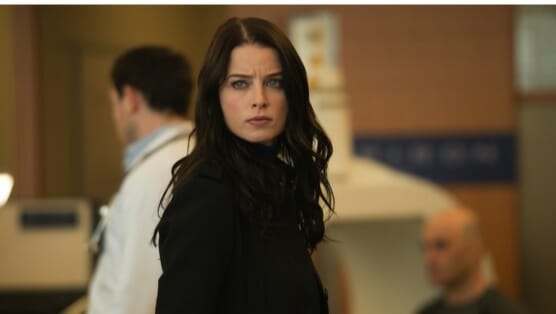
Last week, a seductress riled up in Carlos the notion of secrets. They talked coyly. He drank. Underneath it all, the scene churned doubt and apprehension into a tool for flirtation. Carlos treated it offhandedly then. He’s not here. Piron was infiltrated using a primitive version of the cloaking technology in Kiera’s suit. Kiera’s world is seeping backward into theirs. Alec doesn’t know the half of it. Carlos fills him in with a trip to the morgue. Out comes the flask and more. Bloodletting some of his grim bafflement, Carlos remarks to Alec about the two of them being the “originals.” Kiera’s Kiera, but she’s not their Kiera, they agree. The exchange is a play on perspective. This Carlos and Alec are re-spawns. Our guys imploded offscreen in a time-space collapse.
For the season, these two, particularly Carlos, have grappled with where that leaves them, and the show’s fought the same fight with itself. Carlos declares himself Carlos Numero Uno, but he does so without commitment. It’s a soft lob—an assurance meant for him. Carlos wants the simplicity. Perhaps he partially invites Alec in on these frozen therapeutics for moral reasons. Ambiguity demands more mental gymnastics to lie well: it’s easier to make up what something is not when you know what it is. But more than that, Alec is a genius, extensively versed in quantum physics, and with near-endless resources. Answers are what this kid brings to the table. This isn’t Carlos showing signs of improvement, letting someone in. His desperation is twofold.
The backhanded reveal in the “originals” plea is that Carlos sees Kiera as an intruder. She doesn’t belong there. It’s fair. But Victor Webster’s delivery suggests hostility. Carlos isn’t a sinister character. He can’t harness duplicity the way Dillon can. He’s the teddy bear. Where Dillon morphs, Carlos deteriorates. He seems to be noticing his morbid attitude, but he’s opting for denial. Yes, his Kiera is gone and this one has irreparably tainted his timeline. But time’s malleability is no secret to him. One week or sixty years, the principle is the same.
Continuum’s been plucking at this conflict for weeks. Carlos is unsettled, but he’s existing in this character limbo. The writers haven’t pushed him. They pinched his arm, he awoke to a nightmare, and he’s been sitting in the same cold sweat for four episodes, more or less. It’s characteristic of the series’s serial elements. Its slowness is not Mad Men’s, whose drama moves—and collides—like a glacier. Continuum dangles carrots like latter seasons of 24 dangled moles.
When you’re writing twenty-plus episodes, that can seem necessary—or at least symptomatic. In thirteen, the filler shrinks the story. The show’s stretched its narrative beats—Kiera’s commitment and her “murder,” Dillon’s allegiance, Carlos’s psychology, Alec’s doppelgänger-ing. You could see in the initial scene that Walter poisoned Brock in Breaking Bad. Bryan Bryan Cranston put it in his face. Vince Gilligan, who directed that episode, maximized the visual acoustics of Jesse nearly killing Walter. Editor Kelly Dixon prophetically helped us anticipate what we needed to be looking for. For safe measure, the show overtly confirmed it in the following episode. Continuum would prefer to leave a half-season of distance between those scenes.
Its title is a misnomer: “Minute of Silence” is the of sort television you could consume over the radio. Even its parkour set piece isn’t exactly adrenalized. Yet it satisfies more than Continuum has in a month. Some underground doctor from Kiera’s time turns up in the present. He’d been in a coma and comes to with amnesia. He doesn’t remember his name. Guess whose name he does remember? Kiera spends the episode showing him around like he’s the new kid. At one point, Curtis tries to kill her, or something, and the doctor fends him off. It’s one of the few times Kiera’s needed physical backup. Think he’s special?
He also totes a hologram of his family—a wife and a daughter. He’s Kiera’s mirror. They immediately stumble into some chemistry. His charm and Michael Fassbender-esque beard seem like misdirection. For now, he’s the reminder of what Kiera is: not an intruder, not an impostor; she’s displaced. Pangs of loss spring up as he and Kiera talk about alienation—she from everyone, he from himself. Kiera of old would’ve flinched at the callback to family. Here, we hear her contentment. (It’s been her emotional modus operandi this season, which can explain part of season three’s stuttering when it focuses on her. Contentment does not some drama breed.) She’s now prepared for a lonelier life. He may have her blushing, but she’s initiating the same for him.
As “Minute of Silence” introduces us to a new parallel, an older one grows bleaker and more profound. The Alecs have been the show’s divergent paths. They represent the earthquake of choice: No matter the destruction, it all comes back to a single epicenter. The Alecs arrived the same person. Our Alec tinkered with the landscape that brought week-younger him to be our him. And now Alec B is Young Sadler. His company is robbed, but the real loot is the idea within the piece of hardware: his. Carlos reaches out, but Young Sadler doesn’t see betrayal in his friend’s frozen corpse. He sees access. He’s one of a handful of people who know the universe and time are organic, but he gained that privilege by proxy. There’s been a wall, with Kiera its sentinel. How do you peer through a wall? You drill a hole.
Stray Observations
—Ah, Kellog, I guess being the plot’s bitch wasn’t enough. You had to be Young Sadler’s as well. Not exactly the most exciting sort of kinky, but he’s always been most himself when he’s most lukewarm.
—That said, clearly his maneuvering and Curtis’s assassination attempt (or something) occurring in the same episode is no coincidence.
Kyle Burton is a freelance critic and an inaugural recipient of Indiewire and Sundance’s Roger Ebert Fellowship. You can follow him on Twitter.